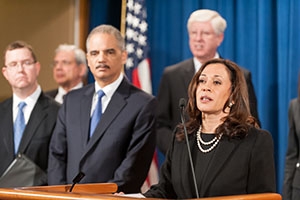On Campus
Gender, Media, and Political Campaigns in a Polarized Era

For women who aspire to hold elected office, researchers have good news: You can generally expect to be treated the same as male candidates by journalists, supporters, and the public.
SPA Professor Jennifer Lawless and her co-author Danny Hayes, associate professor of political science at George Washington University, discussed their book, Women on the Run: Gender, Media and Political Campaigns in a Polarized Era, at a March 6 event on the AU campus.
Their findings challenge the conventional wisdom that women routinely encounter bias and barriers that make it difficult to be elected to office. Lawless and Hayes analyzed the 2010 and 2014 congressional elections and found that the sex of a candidate has a minimal role.
“Reporters have the incentive to cover men and women similarly,” said Lawless, who is director of the AU Women & Politics Institute. “The notion of a battle of the sexes isn’t that interesting anymore. In campaign communication, candidates were talking about the same kinds of things and also voters were assessing men and women the same way.”
That’s not to say that there aren’t examples of sexism on the campaign trail, as Candy Crowley, former chief political correspondent for CNN, noted in her remarks as moderator at the event. But the researchers discovered there is not systematic discrimination. The political environment is fair to women in the vast majority of elections, although the U.S. now ranks 104th globally in female representation in government assemblies.
The problem is getting women to run. Lawless said they need to both be recruited and believe themselves they are qualified. Accomplished women should be encouraged to become candidates by their family, friends and colleagues – a sentiment echoed by many students commenting during the question-and-answer session during the event.
“When women run for office, they are just as likely as men to win their elections,” said Lawless. “They assume it’s far more difficult for women to get elected and they think there is an uneven playing field. In the book, we try to debunk some of those myths.”
